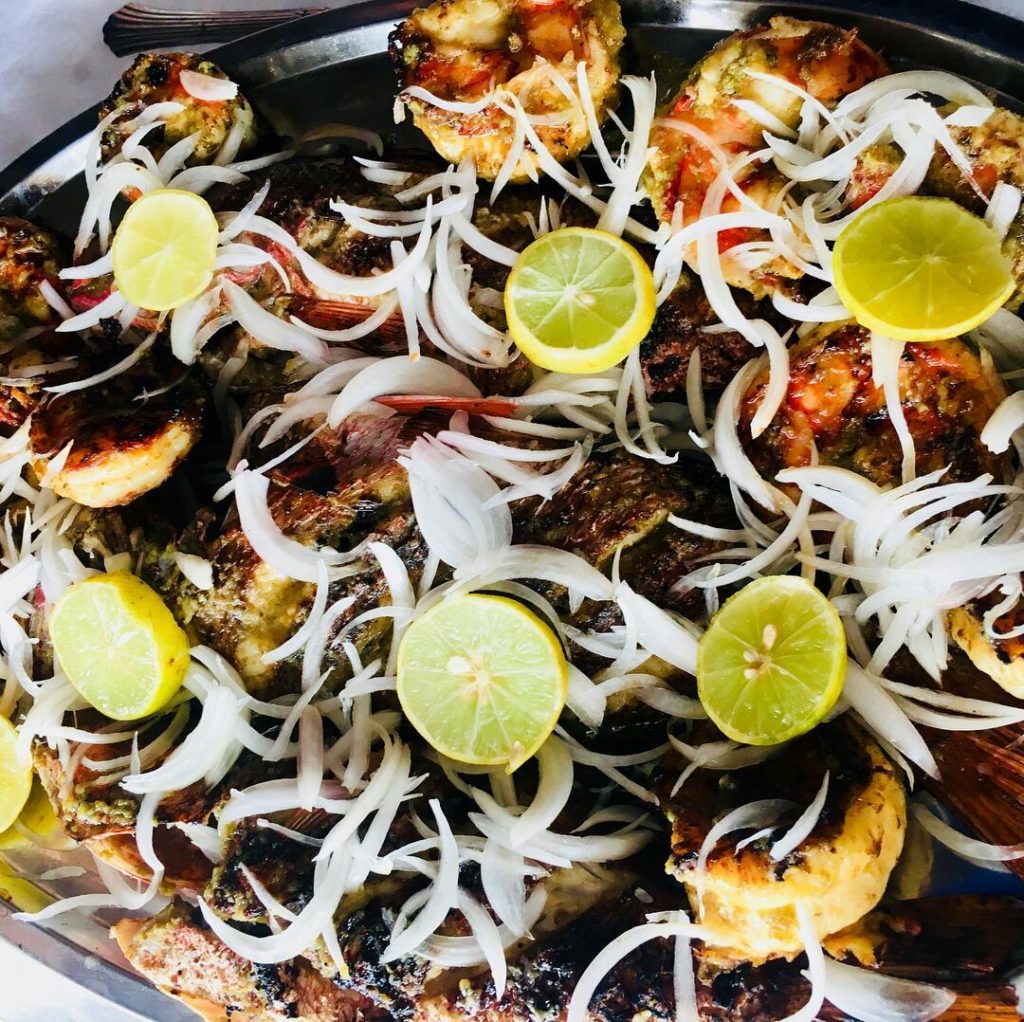(Photo credit: Inna Lazareva)
1.
Choose a place.
That Limbe is a coastal city means it is literally surrounded by fish. Most people love the proximity of Down Beach, which translates into the nearness to raw material, and comes with the sight of the sea, the sound of waves hitting the shore, the tame breeze caressing their faces, and the vulgar moves of the lanky, dark-skinned man who pretends to be Michael Jackson, as they eat. Most people love to watch the former abode of their victims as they devour them with extending smiles of pleasure. Most people love choice; Bar fish, Tilapia, and what is generally called “Sea fish”, and the women and young boys reaching out to beckon and call them as they dither between fish stalls. Most people love this, the power of choosing, and the availability of so many options that you are unable to choose. This is why Down Beach is the somewhat unofficial capital of roast fish in Limbe.
But there are other places too, so many of them. Little individual stalls lining almost every street corner, standing in front of bars as night falls, littering junctions, sending out heady fish flavours, embedded in the smoke, to market their products and bring back customers.
2.
Call a friend, or two.
In this roast-fish-eating business, three is not a crowd. So unless you are fagged out and starving and are just buying to take home, eat and crash, do well to call a few friends. Roast fish is a meal for bonding. When you haven’t seen a friend in a long time, you take them out for drinks and fish; when you have visitors from out of town, you take them out to sample the fish. Know that the eating of roast fish is not so much about the fish as it is about the experience, and the stories, and pictures of and around it. Nobody wants to make memories they can only share with themselves.
3.
Decide your complements.
A handful of people may prefer having their roast fish without any, but the remaining body of people have quite a few of these complements to choose from. You could ask for your fish to be served with plantain, ripe or unripe, roast or fried, or smashed and deep-fried into what is called “tapé tapé”. You could also have it served with cassava, miondo, or bobolo, nicely arranged on the side of the tray like white whips. Mostly though, the bobolo –which is usually about 70 cm long–, is cut into shorter sticks and the miondos are wrapped into a circular shape before serving with the fish. Miondo and bobolo are tasteless-to-sour rope-like cassava dumplings wrapped in leaves and cooked by boiling. They are greyish-to-white in colour and bouncy between the teeth, with bobolo being longer, thicker and harder than miondo. One, therefore, could either prefer the sweetness of ripe plantains, the chalkiness of cassava, or the sour bounciness of miondo and/or bobolo, which all blend deliciously with the spiciness of the fish.
4.
Hone your bargaining skills.
The price of roast fish could vary depending on the seller’s location, the size of the fish, and your accent. The roadside stalls are generally cheaper, with prices ranging from CFAF 1,500 right down to CFAF 350 a fish. When bargaining here, do not go too low; take off CFAF 50 or 100, depending on the initial price. It may seem small, but do not waive it. Do not ask for the price of fish and say “Ok, I’ll take it”; not without cutting down at least CFAF 50 in a bargain. The sellers expect you to. It is in the Roast Fish Buying and Eating Constitution of the Limbe people.
Fish at Down Beach is more expensive. For all the reasons in (1) above and because, here, you probably also pay for the air you breathe. You may find a really small fish at Down Beach for CFAF 1,000 (you would be told it’s CFAF 1,300 and expected to bargain the price down to CFAF 1,000), while CFAF 12,000 would seem a fair price for fish deemed big enough. When buying here, if you have some pidgin English stowed away somewhere inside of you, whip it out and pocket your foreign accent. In fact, the price of a fish can leap from CFAF 2,500 to CFAF 5,000 just because of the ring to your “Hello”; here, foreigners and those who have stayed in foreign (and especially Western) lands get to pay more for the air they breathe…
5.
Know your fish-talk.
Is it too dry or too moist? Did the seasoning penetrate the cuts, seeping through; such that you can taste it right in the bones? Are there too many bones? Talk about the onions and grated carrots sprinkled on the fish like toppings. Are they too much, or too small? Crack a joke: tell your friend(s) visiting from out of town that you love some good head… of fish, of course. Then, go ahead to methodically disembody the head.
Lastly, remember to comment on the pepper… you must talk about the pepper. It is usually said here that, “Fish na e pepper”. This means, basically, that a good roast fish meal is dependent on the pepper sauce it comes with. Is the pepper sauce too raw and hot, and lacking in other spices? Is it too much of a sauce with little or no biting pepper? Is it perfect?
Bonus Tip.
Do not use cutlery to eat roast fish, please: put your fingers to good use. Wash your hands clean to savour the delight and avoid becoming a pariah amidst the fish-loving people of Limbe. Bon appétit!
“How to Eat Roasted Fish in Limbe” is from Bakwa 08:PAIN
